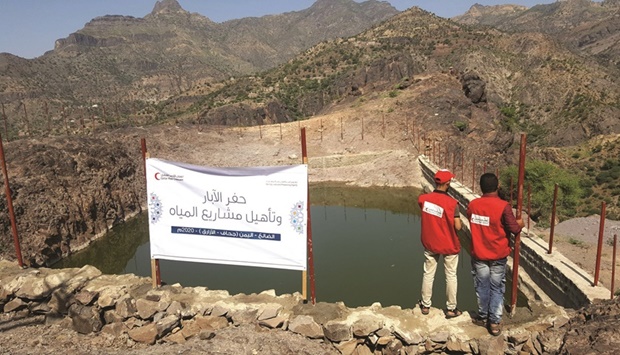Qatar Red Crescent Society (QRCS) launched Phase 3 of a project to dig water wells and to rehabilitate water and environmental sanitation projects in Yemen.
With new 149 water projects in seven Yemeni governorates (Taiz, Dhale, Lahij, Ibb, Al-Mahwit, Sa’ada, and Raymah), this phase will serve a total of 73,500 beneficiaries at a total cost of $1,324,970.
QRCS noted that these projects involve digging two artesian wells in Tuban District, Lahij; digging and rehabilitating 103 manual wells; and rehabilitating 46 water projects with solar-powered pumps. The execution works include constructing collection tanks and pumping systems with all equipment.
In a press statement, Eng Ahmed Hassan al-Sheraji, head of QRCS office in Yemen, said: “This project addresses the suffering of the most vulnerable groups in remote and inaccessible areas due to the high mountainous terrain in the middle of the country’s highest and largest mountain ranges.
“There are scarce sources of potable water, which is too expensive. With this project, the locals no longer have to collect rainwater, which was a very difficult burden, especially during the dry season.
“Even before the completion of Phase 2, we opted to launch Phase 3 to further support water projects, by digging more artesian and manual wells to help close the gap in water and environmental sanitation suffered by people in the target areas,” he said.
Upon the inauguration in Dhale, Saleh Obeid, director-general of Jahaf District, said: “Securing potable water is one of the biggest problems in Dhale, and specifically Jahaf. I hope the water projects will be available very soon, to alleviate the suffering of people here. QRCS’ great contributions are highly valued”.
Mahmoud al-Bakir, a community leader in Bilad At Ta'am District, Raymah, said: “Thanks to QRCS, the suffering of people here will hopefully come to an end. Within a few days, clean and accessible water will be available. Children and women will be safe from the risk of diseases and falling into the wells. Sadly, many families have lost children or women this way”.
QRCS completed Phase 1 of the project, digging and rehabilitating 34 manual wells. Phase 2 is still in progress across governorates, with 141 water projects to provide clean drinking water for the populations of remote and almost isolated areas. In general, the overall budget for the project’s three phases is $2,822,840.
QRCS noted that these projects involve digging two artesian wells in Tuban District, Lahij; digging and rehabilitating 103 manual wells; and rehabilitating 46 water projects with solar-powered pumps. The execution works include constructing collection tanks and pumping systems with all equipment.
In a press statement, Eng Ahmed Hassan al-Sheraji, head of QRCS office in Yemen, said: “This project addresses the suffering of the most vulnerable groups in remote and inaccessible areas due to the high mountainous terrain in the middle of the country’s highest and largest mountain ranges.
“There are scarce sources of potable water, which is too expensive. With this project, the locals no longer have to collect rainwater, which was a very difficult burden, especially during the dry season.
“Even before the completion of Phase 2, we opted to launch Phase 3 to further support water projects, by digging more artesian and manual wells to help close the gap in water and environmental sanitation suffered by people in the target areas,” he said.
Upon the inauguration in Dhale, Saleh Obeid, director-general of Jahaf District, said: “Securing potable water is one of the biggest problems in Dhale, and specifically Jahaf. I hope the water projects will be available very soon, to alleviate the suffering of people here. QRCS’ great contributions are highly valued”.
Mahmoud al-Bakir, a community leader in Bilad At Ta'am District, Raymah, said: “Thanks to QRCS, the suffering of people here will hopefully come to an end. Within a few days, clean and accessible water will be available. Children and women will be safe from the risk of diseases and falling into the wells. Sadly, many families have lost children or women this way”.
QRCS completed Phase 1 of the project, digging and rehabilitating 34 manual wells. Phase 2 is still in progress across governorates, with 141 water projects to provide clean drinking water for the populations of remote and almost isolated areas. In general, the overall budget for the project’s three phases is $2,822,840.



